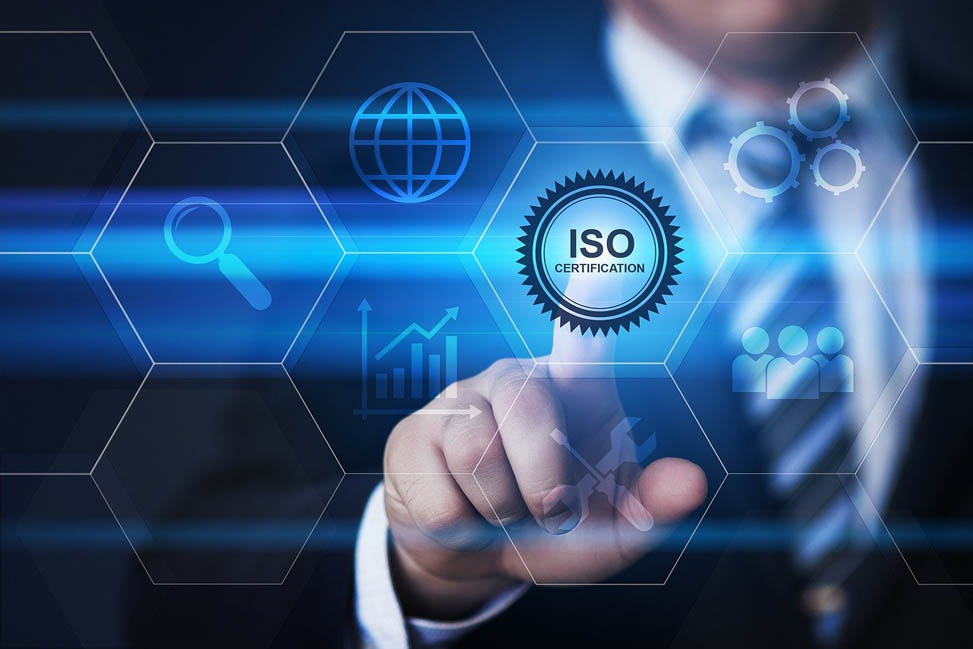Avec la mondialisation et la communication internationale, le secteur de la traduction continue d'étendre son influence. Des collaborations commerciales aux échanges culturels, les services de traduction jouent un rôle essentiel dans divers secteurs. Cependant, la qualité de la traduction a toujours été l'un des sujets les plus discutés dans le secteur, en particulier dans des domaines spécialisés tels que le droit, la santé et la finance, où l'exactitude et la fiabilité des traductions sont cruciales pour les décisions et la sécurité des clients. Pour garantir la qualité et la normalisation des services de traduction, le développement du secteur de la traduction dépend d'un système de certification complet.
La certification des traducteurs garantit non seulement la qualité des traductions, mais constitue également une base de confiance pour les clients. La certification des agences de traduction et des traducteurs signifie le respect des meilleures pratiques du secteur et des normes internationales tout au long du processus de prestation de services. Par conséquent, la certification des traducteurs joue un rôle important dans l'amélioration de la qualité du service, le renforcement de la confiance des clients et l'aide aux agences de traduction pour se démarquer sur un marché concurrentiel.
Cet article examine le système de certification dans le secteur de la traduction, en se concentrant sur les rôles et les impacts des différentes certifications de traduction, notamment ISO 17100, ISO 13485 et ISO/IEC 27001. Il vise à aider les professionnels et les clients du secteur à comprendre comment la certification peut améliorer la qualité des services de traduction et soutenir le développement durable du secteur de la traduction.
Aperçu du système de certification du secteur de la traduction
La certification en traduction désigne le processus par lequel les organismes de certification professionnels évaluent et vérifient les capacités et les qualifications des prestataires de services de traduction selon un ensemble de normes. La certification vise à garantir que les agences de traduction et les traducteurs peuvent fournir des services de traduction de haute qualité qui répondent aux exigences du secteur. Alors que la concurrence sur le marché de la traduction s'intensifie, la certification est devenue un outil efficace pour les agences de traduction pour démontrer leur professionnalisme et améliorer leur compétitivité sur le marché.
Le rôle de la certification dans le secteur de la traduction peut être résumé dans les domaines suivants :
- Assurance qualité: La certification des traductions fait partie d'un système de gestion de la qualité qui permet aux entreprises de traduction de s'assurer que chaque projet répond à des normes de qualité prédéfinies. Grâce à la certification, les entreprises peuvent contrôler efficacement le processus de traduction et améliorer la qualité du service.
- Confiance des clients : Pour les clients, la certification est un critère important dans le choix d'un prestataire de services de traduction. Les agences de traduction disposant de certifications internationales renforcent la confiance dans la qualité de leurs services, en particulier dans des domaines sensibles comme le droit et la santé, où la certification est essentielle pour garantir l'exactitude et la conformité des traductions.
- Normalisation industrielle : La certification favorise la normalisation du secteur de la traduction, contribuant à établir des normes opérationnelles unifiées qui rendent le secteur plus professionnel et plus efficace.
Norme ISO 17100
La norme ISO 17100 est l'une des principales normes de certification du secteur de la traduction. Elle définit un ensemble d'exigences systématiques en matière de gestion de la qualité pour les prestataires de services de traduction. La norme garantit que les sociétés de traduction fournissent des services de haute qualité et normalise les processus de traduction et le contrôle qualité.
La norme ISO 17100 a été publiée par l'Organisation internationale de normalisation (ISO) en 2015. Elle s'applique à toutes les entreprises et organisations fournissant des services de traduction, y compris les prestataires de services linguistiques (PSL) et les sociétés d'externalisation de la traduction. La norme met particulièrement l'accent sur la gestion de l'ensemble du processus de prestation de services de traduction, de l'analyse des besoins à la mise en œuvre de la traduction, en passant par les contrôles qualité et les retours des clients.
Les éléments clés de la norme ISO 17100 comprennent :
- Gestion du processus de traduction : La norme exige que les sociétés de traduction gèrent clairement chaque étape du projet de traduction, y compris le lancement du projet, la traduction, l'édition, la relecture, etc., en veillant à ce que chaque étape respecte les normes de contrôle qualité.
- Qualifications du traducteur : La norme ISO 17100 exige que les agences de traduction s'assurent que leurs traducteurs possèdent des compétences professionnelles en traduction, au moins trois ans d'expérience pertinente, ou possèdent un diplôme ou une certification en traduction. De plus, les traducteurs doivent posséder des connaissances spécifiques au domaine pour comprendre et utiliser avec précision la terminologie professionnelle.
- Contrôle de qualité: Les sociétés de traduction doivent effectuer plusieurs contrôles de qualité, y compris des révisions et des relectures, pour garantir que la traduction est exacte, fluide et fidèle au sens original.
- Support technique : La norme ISO 17100 encourage les entreprises de traduction à utiliser des outils de traduction assistée par ordinateur (TAO) pour améliorer l'efficacité et la cohérence des traductions. La norme exige également la mise en place de bases terminologiques et de systèmes de mémoire de traduction pour assurer la cohérence et la qualité des traductions.
En obtenant la certification ISO 17100, les agences de traduction peuvent démontrer leur professionnalisme et la qualité de leurs services au marché, renforçant ainsi la confiance et la fidélité de leurs clients. La gestion standardisée des processus contribue également à améliorer l'efficacité opérationnelle interne et à réduire le risque d'erreurs de traduction et de retards dans les projets. Dans le monde de plus en plus globalisé d'aujourd'hui, les agences de traduction certifiées ISO 17100 se distinguent sur le marché mondial, attirant des clients de grande qualité.
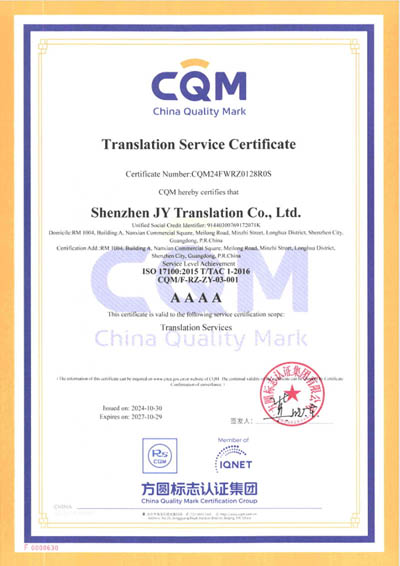
ISO 13485 : La relation entre le secteur de la traduction et la traduction médicale
Dans le domaine de la traduction médicale, la norme ISO 13485 fournit des conseils spécialisés aux sociétés de traduction pour garantir que leurs services répondent aux exigences strictes de qualité et de conformité du secteur de la santé.
La norme ISO 13485 est une norme internationale relative aux systèmes de gestion de la qualité des dispositifs médicaux, conçue pour garantir la gestion de la qualité des dispositifs médicaux et des documents associés. Dans le secteur de la traduction, la norme ISO 13485 s'applique à la traduction médicale, en particulier dans des domaines tels que les dispositifs médicaux, les notices de médicaments et les documents d'information destinés aux patients. La norme exige que les sociétés de traduction garantissent l'exactitude, la conformité et la confidentialité lors du traitement de ces documents sensibles.
La norme ISO 13485 impose aux agences de traduction de mettre en place une gestion rigoureuse du processus de traduction médicale, notamment une formation professionnelle pour les traducteurs, des processus de contrôle de la qualité et des mesures de confidentialité des documents. Cela est essentiel pour garantir que les documents de traduction médicale sont conformes aux réglementations du secteur, en particulier aux différentes réglementations nationales.
La traduction médicale est confrontée à des défis tels que l'utilisation d'une terminologie spécialisée, la diversité réglementaire et le besoin de précision de la traduction. La norme ISO 13485 aide les sociétés de traduction à surmonter ces défis en fournissant un cadre clair pour la gestion de la qualité, garantissant que les documents traduits répondent non seulement aux exigences linguistiques mais également aux réglementations strictes du secteur médical.
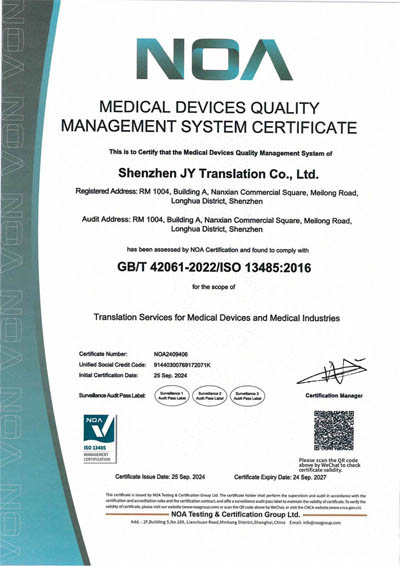
ISO/CEI 27001 : une clé pour la gestion de la sécurité de l'information
La sécurité des informations est particulièrement importante dans le secteur de la traduction, notamment lors de la traduction de données sensibles telles que des documents juridiques, des rapports financiers et des dossiers médicaux. La norme ISO/IEC 27001 est la norme mondiale de gestion de la sécurité des informations, applicable aux sociétés de traduction pour garantir la confidentialité et la sécurité des données sensibles pendant le processus de traduction.
La norme ISO/IEC 27001 fournit aux sociétés de traduction un cadre pour la mise en place d'un système de gestion de la sécurité de l'information afin de garantir que les informations des clients ne soient ni divulguées ni compromises pendant la traduction. La norme couvre des aspects tels que la protection des données, l'évaluation des risques, le stockage et la transmission des informations, aidant ainsi les sociétés de traduction à aligner leurs opérations sur les meilleures pratiques en matière de gestion de la sécurité de l'information à l'échelle internationale.
Les agences de traduction doivent se conformer aux exigences de la norme ISO/IEC 27001 en établissant des politiques de sécurité des informations, en formant le personnel et en mettant en œuvre des mesures de sécurité pour garantir la sécurité de toutes les données pendant la traduction. Par exemple, les entreprises peuvent utiliser des systèmes de transmission et de stockage cryptés pour garantir que les informations sensibles des clients ne soient pas consultées par des tiers non autorisés.
En obtenant la certification ISO/IEC 27001, les agences de traduction peuvent garantir à leurs clients la conformité et l'efficacité de leurs systèmes de gestion de la sécurité de l'information. Cela est particulièrement important lors de la gestion de projets de traduction impliquant des données sensibles, telles que des documents juridiques, médicaux et financiers. Les clients peuvent faire confiance aux entreprises certifiées pour gérer les documents confidentiels, réduisant ainsi le risque de violation des informations.
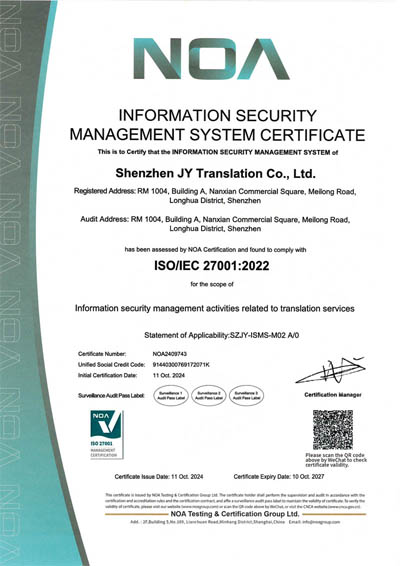
Autres certifications pertinentes dans le secteur de la traduction
Outre les normes ISO 17100, ISO 13485 et ISO/IEC 27001, il existe d’autres certifications pertinentes dans le secteur de la traduction qui aident les entreprises à améliorer leurs normes de gestion et la qualité de leurs services.
ISO 9001 : Système de gestion de la qualité
La norme ISO 9001 est une norme de gestion de la qualité reconnue à l'échelle mondiale et applicable à tous les secteurs d'activité. Dans le secteur de la traduction, la norme ISO 9001 aide les entreprises à établir des systèmes systématiques de gestion de la qualité pour garantir que le résultat de chaque projet répond aux exigences des clients et aux normes du secteur. En obtenant la certification ISO 9001, les sociétés de traduction démontrent leur engagement en matière de gestion de la qualité et d'amélioration continue de la qualité de leurs services.
Normes de gestion des projets de traduction
Les normes de gestion de projets de traduction (comme l'ATA et d'autres normes du secteur) jouent également un rôle important dans le secteur de la traduction. Elles fournissent des cadres et des outils pour aider les entreprises de traduction à gérer efficacement les projets de traduction, en garantissant la qualité, la rapidité et le contrôle des coûts.
Comment choisir la bonne certification
Lors de la sélection des certifications, les sociétés de traduction doivent tenir compte de leur secteur d'activité spécifique, des besoins des clients et des caractéristiques du secteur. Par exemple, une société de traduction médicale sera peut-être plus encline à obtenir la certification ISO 13485, tandis qu'une société de traduction juridique privilégiera la certification ISO/IEC 27001 pour garantir la sécurité des informations.
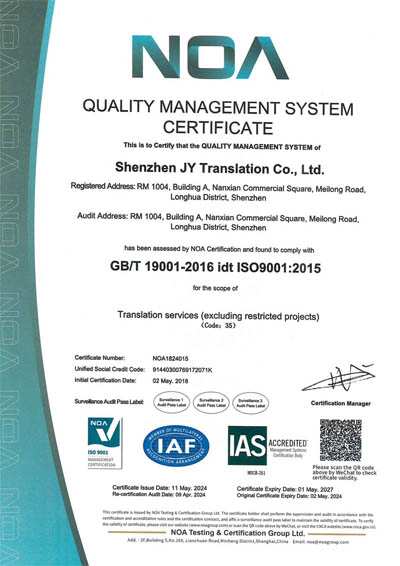
L’importance de la certification pour les clients
Pour les clients, la certification des traducteurs est une base essentielle pour choisir un prestataire de services de traduction. Les normes de certification aident les clients à évaluer plus facilement la qualité et le professionnalisme des agences de traduction.
La certification atteste que les agences de traduction respectent les normes internationales et peuvent fournir des services de traduction de haute qualité. Les clients peuvent sélectionner des agences de traduction réputées sur la base de la certification, réduisant ainsi le risque d'erreurs de traduction et garantissant l'exactitude des traductions.
Dans certains secteurs, la conformité des traductions est essentielle. Par exemple, dans les domaines de la santé, du droit et de la finance, les documents traduits doivent respecter des normes juridiques et sectorielles strictes. Les normes de certification aident les sociétés de traduction à se conformer à ces réglementations, en garantissant que les travaux traduits répondent aux exigences légales.
Les avantages du système de certification de J&Y Translation
En tant que société leader dans le secteur de la traduction, J&Y Translation a obtenu plusieurs certifications internationales grâce à ses efforts continus en matière de contrôle de la qualité et de gestion de la sécurité des informations. Ces certifications renforcent non seulement l'avantage concurrentiel de J&Y Translation, mais offrent également aux clients des services de traduction de meilleure qualité et plus sûrs. Les principales certifications comprennent :
- ISO/CEI 27001:2022 (Certification du système de gestion de la sécurité de l'information)
- ISO 13485:2016 (Certification du système de gestion de la qualité des dispositifs médicaux)
- ISO 9001:2015 (Certification du Système de Gestion de la Qualité)
- Certification des services de traduction (Certification de service professionnel pour le secteur de la traduction)
Avec des certifications telles que ISO 9001, ISO 13485 et ISO/IEC 27001, J&Y Translation a établi un solide avantage concurrentiel dans le secteur de la traduction. Ces certifications fournissent des systèmes de gestion de la qualité efficaces et des garanties de sécurité des informations, offrant aux clients des services de traduction fiables et dignes de confiance. Grâce à ces certifications, J&Y Translation répond aux exigences rigoureuses de divers secteurs, notamment dans les domaines de la santé, du droit et de la finance, garantissant que chaque traduction respecte les réglementations du secteur et les normes élevées des clients. Le système de certification de J&Y Translation est essentiel à son leadership continu sur le marché mondial de la traduction, renforçant encore son engagement à fournir des services de traduction exceptionnels à ses clients.
Le système de certification dans le secteur de la traduction joue un rôle essentiel dans l'amélioration de la qualité des services de traduction, le renforcement de la confiance des clients et la promotion de la normalisation du secteur. Grâce à la certification, les sociétés de traduction peuvent améliorer leur professionnalisme et gagner la reconnaissance et le soutien des clients. Pour les clients, la certification offre une base fiable pour choisir un prestataire de services de traduction qui respecte les normes du secteur. Dans le monde actuel de plus en plus globalisé et axé sur l'information, la certification de la traduction continuera de jouer un rôle crucial dans la croissance et le succès du secteur.

